Loading...
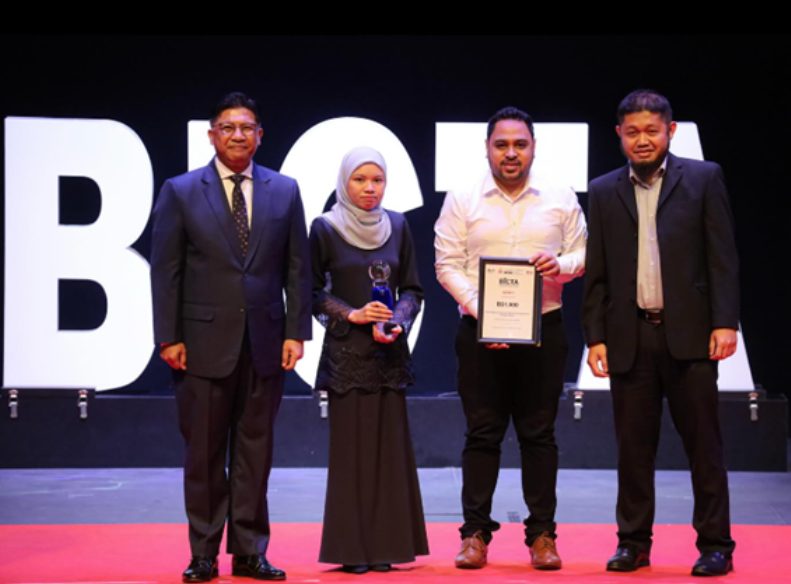 A student-led team from Universiti Brunei Darussalam (UBD) has achieved success at the Brunei ICT Awards (BICTA) 2025, winning the Merit Award in the Tertiary School category with their innovative project, KelulutSentri AI.
A student-led team from Universiti Brunei Darussalam (UBD) has achieved success at the Brunei ICT Awards (BICTA) 2025, winning the Merit Award in the Tertiary School category with their innovative project, KelulutSentri AI.
KelulutSentri AI is an artificial intelligence-powered monitoring system designed specifically for stingless bee (kelulut) hives. The system relies on continuous AI-driven acoustic analysis to detect alarm buzzes produced by guard bees in the presence of intruders. When a potential threat is detected, an AI-triggered camera is activated to confirm the presence of an intruder by capturing images, which are then automatically classified into categories such as human, monkey, ants, or rival bee swarms, providing bee farmers with clear and actionable information. A companion mobile application delivers real-time alerts with this visual evidence. As the acoustic AI model is currently optimized for Heterotrigona itama (the most widely farmed stingless bee species in Brunei and the region), the setup includes an image-based species identification feature for 11 stingless bee types during the initial setup to ensure proper calibration. By prioritizing low-power acoustic sensing and activating the camera only when intrusion is suspected, KelulutSentri AI conserves energy, making it well-suited for rural or off-grid farms where power and internet access are limited. Fully automated and requiring no constant human observation, the system helps farmers safeguard colonies, minimize hive losses, and improve honey production efficiency.
The project is led by Ashan Milinda Bandara Ratnayake, a PhD candidate at the Faculty of Integrated Technologies (FIT), whose doctoral research focuses on acoustic and visual AI for hive monitoring. He is supported by Marha Sahirah binti Majid from the Faculty of Science (FoS), whose Master’s work on the characterisation of stingless bee honey and propolis provided important biological insights for system validation. The project is supervised by Pg Dr Emeroylariffion Abas (FIT), Dr Hartini Yasin (FoS), and Dr Ghani Naim (School of Digital Science, SDS), who together contributed expertise spanning AI systems, stingless bee product characterisation, and practical field insights as a hobbyist beekeeper. Through this multi-disciplinary collaboration, the system has advanced from research concepts to a working prototype tested under Brunei’s field conditions.
This achievement has also been made possible through the support of the Faculty of Integrated Technologies (FIT) and the Office of the Assistant Vice-Chancellor Research, Innovation and Sustainability (OAVCRIS), which funded the project under a research grant, as well as the Institute for Biodiversity and Environmental Research (IBER) through UBD Botanical Research Centre (BRC), which provided a test site for system validation. The recognition highlights how multi-disciplinary collaboration across faculties and strong institutional support can foster innovation that is both academically rigorous and socially relevant.
Looking ahead, the team is preparing to expand field trials with local farmers, strengthen intellectual property protection through UBD’s Innovation Office, and explore commercialization pathways. With global interest in stingless bee farming continuing to grow, KelulutSentri AI is well-positioned to contribute not only to Brunei’s aspirations in digital innovation and sustainable agriculture but also to the wider regional agenda of pollinator protection and biodiversity conservation.
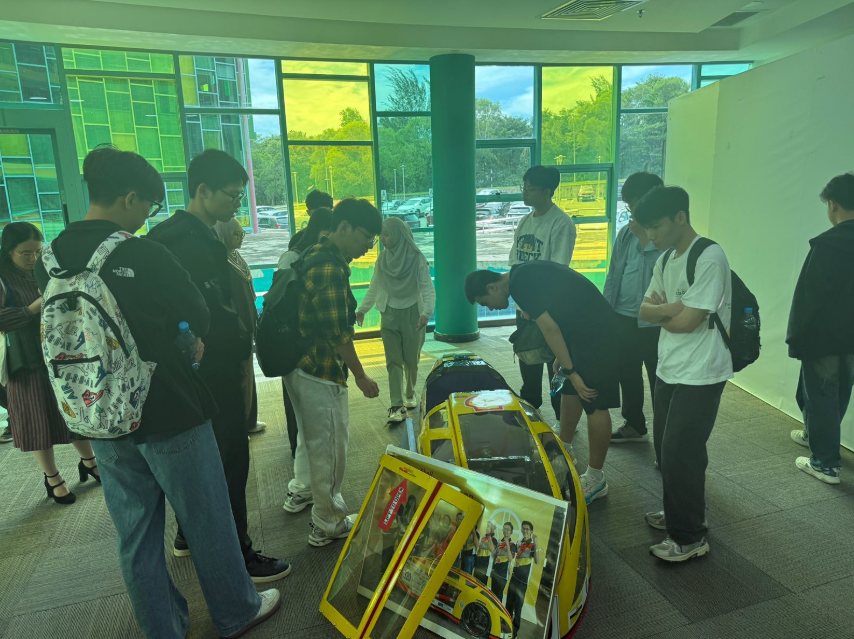
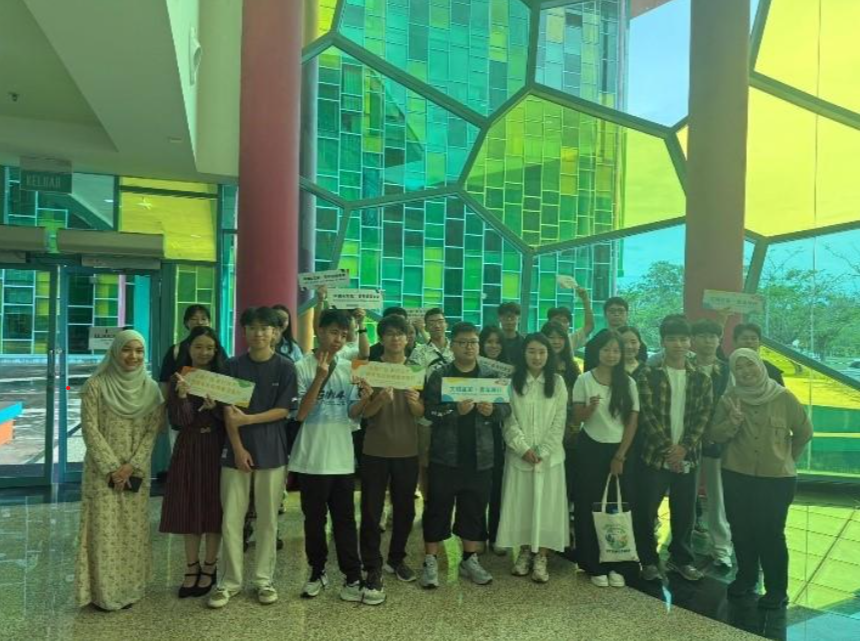 On 14 August 2025, the Faculty of Integrated Technologies (FIT) welcomed a delegation of 24 students and teachers from Guilin University of Electronic Technology (GUET), China. The visit took place at the Integrated Science Building of Universiti Brunei Darussalam (UBD) and marked an important opportunity for academic and cultural exchange between the two institutions.
On 14 August 2025, the Faculty of Integrated Technologies (FIT) welcomed a delegation of 24 students and teachers from Guilin University of Electronic Technology (GUET), China. The visit took place at the Integrated Science Building of Universiti Brunei Darussalam (UBD) and marked an important opportunity for academic and cultural exchange between the two institutions.
During the visit, the delegation toured several of FIT’s flagship projects and state-of-the-art laboratories. Among the highlights were the Trash Collector Project, the UBD Shell Eco-Marathon vehicles, and the FIT Design, Modelling and Fabrication Laboratory, where innovative student and staff projects were showcased. The guests also explored the FIT Additive Manufacturing Laboratory, the SDS Robotics Lab, and the FIT Communications Laboratory, each demonstrating FIT’s commitment to advanced technology, applied research, and hands-on learning.
This visit not only strengthened ties between FIT and GUET but also provided a platform for sharing knowledge, inspiring collaboration, and highlighting the innovative projects that define FIT’s approach to engineering education.
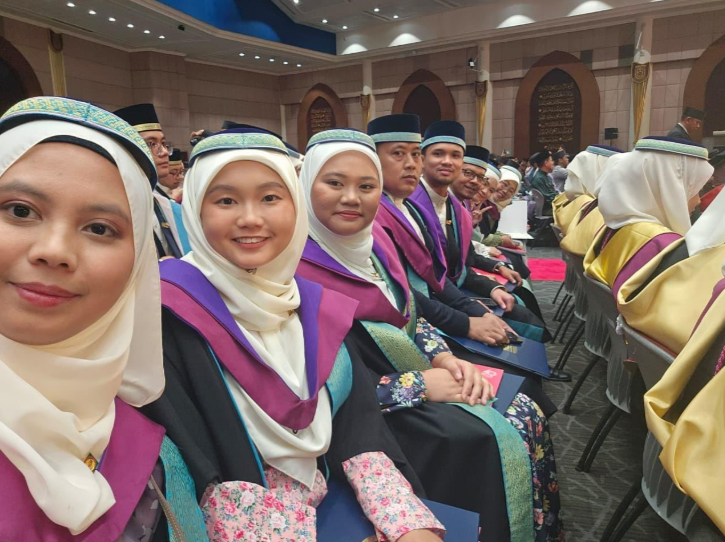
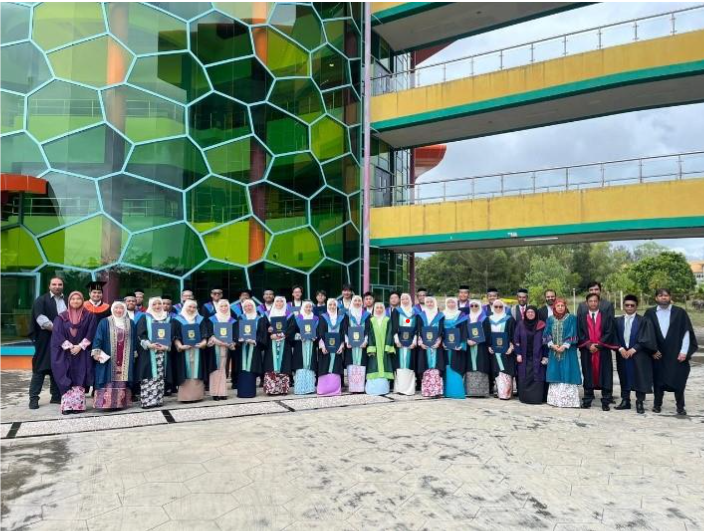 Universiti Brunei Darussalam (UBD) held its 37th convocation on 13 August 2025, celebrating the achievements of its graduating students. FIT proudly marked the graduation of several students, including 7 PhD graduates, 7 Master’s graduates, 5 General Engineering undergraduates, and 33 Chemical and Process Engineering undergraduates.
Universiti Brunei Darussalam (UBD) held its 37th convocation on 13 August 2025, celebrating the achievements of its graduating students. FIT proudly marked the graduation of several students, including 7 PhD graduates, 7 Master’s graduates, 5 General Engineering undergraduates, and 33 Chemical and Process Engineering undergraduates.
The following day was dedicated to the presentation of book prizes and medals. Among the notable awardees, Lei Jian Ting received the Silver University Medal as well as the Excellence Award sponsored by Brunei LNG Sdn. Bhd. Jelena Shea binti Harun was awarded the book prize sponsored by Hengyi Industries Sdn. Bhd. for Level 4000 & 5000 students (Major). Teo Kai Lee received the Hengyi-sponsored book prize for Level 2000 & 3000 students (Major), while Mohammad Danish bin Khalid was awarded the book prize sponsored by Imagine Sdn. Bhd. for Level 2000 & 3000 students (Major).
Additionally, Lei Jian Ting, Su Jih Yang, and Chu Ching Cheng were recognised with the Hengyi Special Mention Award, further highlighting the exceptional achievements of FIT students at this year’s convocation.
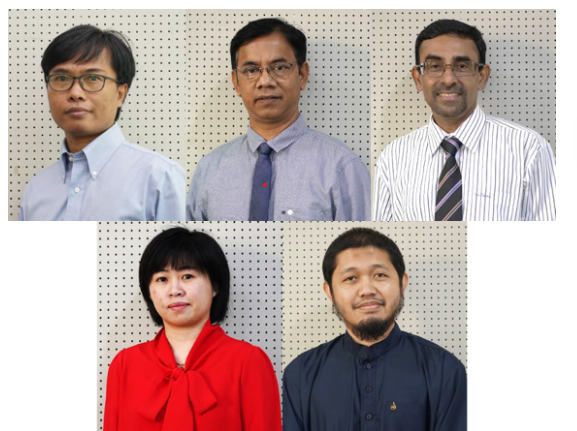 The Faculty of Integrated Technologies (FIT) proudly congratulates its staff for being recognised among the top 2% of scientists from Universiti Brunei Darussalam (UBD) in the 2025 Stanford Global Ranking of Scientists.
The Faculty of Integrated Technologies (FIT) proudly congratulates its staff for being recognised among the top 2% of scientists from Universiti Brunei Darussalam (UBD) in the 2025 Stanford Global Ranking of Scientists.
The distinguished faculty members include:
This recognition highlights the outstanding research contributions of FIT staff and underscores the faculty’s commitment to advancing knowledge and innovation on a global scale.
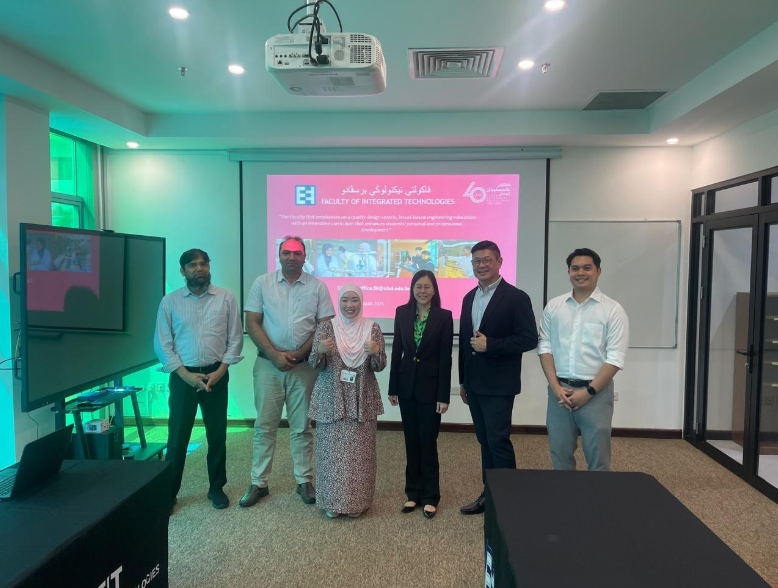 On 26 August 2025, the Faculty of Integrated Technologies (FIT) welcomed Ms Lynette Tan, CEO of SpaceFaculty, and Mr Cedric Ng, Head of Business Development. The visit showcased FIT’s innovative research and forward-looking curriculum, highlighting opportunities for collaboration in engineering and space-related fields.
On 26 August 2025, the Faculty of Integrated Technologies (FIT) welcomed Ms Lynette Tan, CEO of SpaceFaculty, and Mr Cedric Ng, Head of Business Development. The visit showcased FIT’s innovative research and forward-looking curriculum, highlighting opportunities for collaboration in engineering and space-related fields.
Guests toured FIT’s advanced facilities, including the Additive Manufacturing Lab, where pioneering work in electrohydrodynamic printing for thin-film fabrication was demonstrated, and the Robotics Lab (School of Digital Science), where postgraduate students presented diverse robotics projects. The visit concluded with positive discussions on future partnerships between FIT and SpaceFaculty, underscoring shared ambitions to drive innovation and nurture future-ready engineers.
 At the Crown Prince CIPTA Award 2025—Creative, Innovative Product and Technological Advancement, hosted by Universiti Teknologi Brunei (UTB)—a project from the Faculty of Integrated Technologies (FIT) was honoured with the Special Mention Prize in Local Category 1: Creating New Product, Process and Technology. The theme for this year’s competition was Green Innovation.
At the Crown Prince CIPTA Award 2025—Creative, Innovative Product and Technological Advancement, hosted by Universiti Teknologi Brunei (UTB)—a project from the Faculty of Integrated Technologies (FIT) was honoured with the Special Mention Prize in Local Category 1: Creating New Product, Process and Technology. The theme for this year’s competition was Green Innovation.
The project, titled “Organic Solar Cells Fabricated Using Electrohydrodynamic (EHD) Printing for Sustainable Energy Solution,” was developed by FIT graduate Dr. Zulfikre Esa under the supervision of Dr. Malik Muhammad Nauman. It explores the use of electrohydrodynamic (EHD) printing, a precise additive manufacturing technique, to create organic solar cells (OSCs) under ambient conditions with minimal material waste.
This innovative approach offers a scalable, cost-effective, and environmentally friendly alternative for fabricating solar energy devices. Beyond solar cells, the project highlights the broader potential of EHD printing technology in fabricating advanced functional materials and devices with high precision and material efficiency. This recognition reflects FIT’s dedication to fostering impactful research that supports renewable energy development and sustainable manufacturing, aligning closely with the green innovation theme of CIPTA 2025.
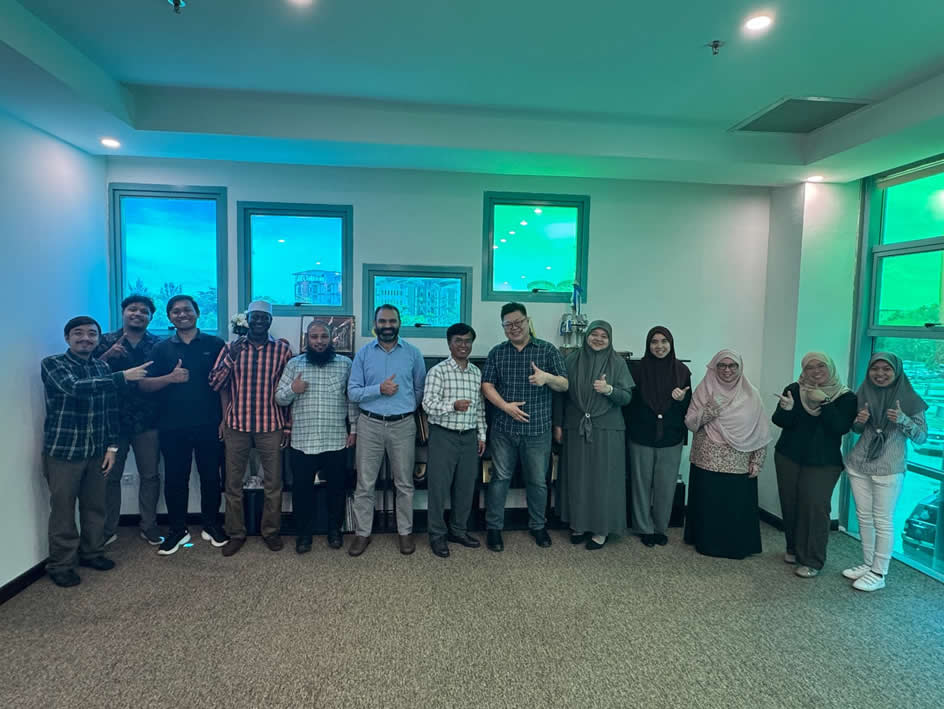 A mini workshop on Process Graph (P-Graph) was conducted by Prof. Dr. Hon Loong Lam, Professor at the University of Nottingham Malaysia and Director of the Centre of Excellence for Green Technologies. The session introduced participants to P-Graph, a graph-theoretic tool used for process network synthesis and optimisation. The workshop explored how P-Graph methodology can enhance resource efficiency, support waste reduction, and promote system-wide sustainability. Through a combination of foundational principles, real-world case studies, and applications in both research and teaching, attendees gained valuable insights into the versatility of P-Graph. This initiative supports several UN Sustainable Development Goals (SDGs), particularly SDG 7 (Affordable and Clean Energy), SDG 9 (Industry, Innovation and Infrastructure), and SDG 12 (Responsible Consumption and Production). The session provided a practical platform for researchers, academics, and students to engage with innovative tools that align with global sustainability efforts.
A mini workshop on Process Graph (P-Graph) was conducted by Prof. Dr. Hon Loong Lam, Professor at the University of Nottingham Malaysia and Director of the Centre of Excellence for Green Technologies. The session introduced participants to P-Graph, a graph-theoretic tool used for process network synthesis and optimisation. The workshop explored how P-Graph methodology can enhance resource efficiency, support waste reduction, and promote system-wide sustainability. Through a combination of foundational principles, real-world case studies, and applications in both research and teaching, attendees gained valuable insights into the versatility of P-Graph. This initiative supports several UN Sustainable Development Goals (SDGs), particularly SDG 7 (Affordable and Clean Energy), SDG 9 (Industry, Innovation and Infrastructure), and SDG 12 (Responsible Consumption and Production). The session provided a practical platform for researchers, academics, and students to engage with innovative tools that align with global sustainability efforts.